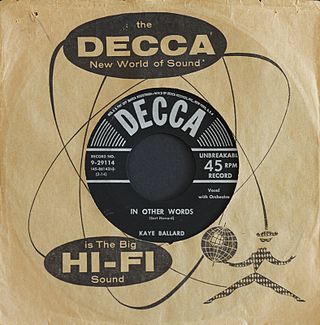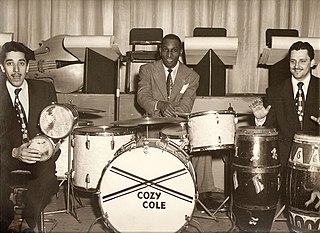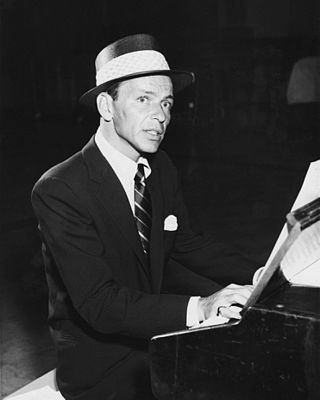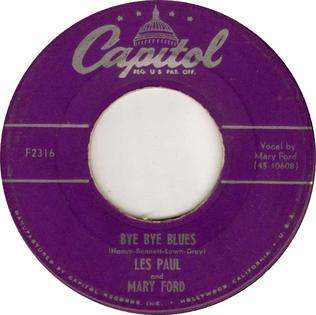Related Research Articles
The Billboard Hot 100 is the music industry standard record chart in the United States for songs, published weekly by Billboard magazine. Chart rankings are based on sales, radio play, and online streaming in the United States.

Foreststorn "Chico" Hamilton was an American jazz drummer and bandleader. He came to prominence as sideman for Lester Young, Gerry Mulligan, Count Basie, and Lena Horne. Hamilton became a bandleader, first with a quintet featuring the cello as a lead instrument, an unusual choice for a jazz band in the 1950s, and subsequently leading bands that performed cool jazz, post bop, and jazz fusion.

"Fly Me to the Moon", originally titled "In Other Words", is a song written in 1954 by Bart Howard. The first recording of the song was made in 1954 by Kaye Ballard. Frank Sinatra's 1964 version was closely associated with the Apollo missions to the Moon.

"I Can't Stop Loving You" is a popular song written and composed by country singer, songwriter, and musician Don Gibson, who first recorded it on December 3, 1957, for RCA Victor Records. It was released in 1958 as the B-side of "Oh, Lonesome Me", becoming a double-sided country hit single. At the time of Gibson's death in 2003, the song had been recorded by more than 700 artists, most notably by Ray Charles, whose recording reached No. 1 on the Billboard chart.

William Randolph "Cozy" Cole was an American jazz drummer who worked with Cab Calloway and Louis Armstrong among others and led his own groups.

American vocalist Frank Sinatra recorded 59 studio albums and 297 singles in his solo career, spanning 54 years. Sinatra signed with Columbia Records in 1943; his debut album The Voice of Frank Sinatra was released in 1946. Sinatra would achieve greater success with Capitol and Reprise Records, the former of which he released his final two albums on—Duets and Duets II. Eight compilation albums under Sinatra's name were released in his lifetime, with more albums released following his death in 1998.
"Deep Purple" was the biggest hit written by pianist Peter DeRose, who broadcast, 1923 to 1939, with May Singhi as "The Sweethearts of the Air" on the NBC radio network. "Deep Purple" was published in 1933 as a piano composition. Although it is a slow ballad, its armonic and melodic style echoes the brilliant music by George Gershwin. The following year, Paul Whiteman had it scored for his suave "big band" orchestra that was "making a lady out of jazz" in Whiteman's phrase. "Deep Purple" became so popular in sheet music sales that Mitchell Parish added lyrics in 1938.

"Smoke Gets in Your Eyes" is a show tune written by American composer Jerome Kern and lyricist Otto Harbach for the 1933 musical Roberta. The song was sung in the Broadway show by Tamara Drasin. Its first recorded performance was by Gertrude Niesen, who recorded the song with orchestral direction from Ray Sinatra, Frank Sinatra's second cousin, on October 13, 1933. Niesen's recording of the song was released by Victor, with the B-side, "Jealousy", featuring Isham Jones and his Orchestra.
"Pennies from Heaven" is a 1936 American popular song with music by Arthur Johnston and lyrics by Johnny Burke. It was introduced by Bing Crosby with Georgie Stoll and his Orchestra in the 1936 film of the same name.

William Randall Henderson was an American jazz singer and actor in television and film.
"Walk, Don't Run" is an instrumental composition written and originally recorded by jazz guitarist Johnny Smith in 1954.

Frank Sinatra's musical career began in the swing era in 1935, and ended in 1995, although he did briefly retire in 1971, before returning to music in 1973. Sinatra is one of the most influential music artists of the 20th century, and has sold 150 million records worldwide, making him one of the best-selling music artists of all-time. Rock critic Robert Christgau called Sinatra "the greatest singer of the 20th century". In addition to his music career, Sinatra was also a successful film actor, having won the Academy Award for Best Supporting Actor for his role as Private Angelo Maggio in From Here to Eternity (1953).
"That's My Desire" is a 1931 popular song with music by Helmy Kresa and lyrics by Carroll Loveday.

"Bye Bye Blues" is an American popular and jazz standard written by Fred Hamm, Dave Bennett, Bert Lown, and Chauncey Gray and published in 1925.
"Wives and Lovers" is a 1963 song by Burt Bacharach and Hal David. It has been recorded by numerous male and female vocalists, instrumentalists and ensembles, most notably by Jack Jones in 1963. That recording earned the 1964 Grammy Award for Best Vocal Performance, Male, and peaked at number fourteen on the Hot 100 and number nine on the Easy Listening chart.
"You Can Depend on Me" is a song written by Charles Carpenter, Louis Dunlap and Earl "Fatha" Hines. and first recorded by Louis Armstrong. It should not be confused with the song of the same name, "(You Can) Depend on Me," recorded by Smokey Robinson and The Miracles in 1959.
"Little Green Apples" is a song written by Bobby Russell that became a hit for three different artists, with their three separate releases, in 1968. Originally written for and released by American recording artist Roger Miller, "Little Green Apples" was also released as a single by American recording artists Patti Page and O. C. Smith that same year. Miller's version became a Top 40 hit on the Billboard Hot 100 chart and on the UK Singles Chart, while Page's version became her last Hot 100 entry and Smith's version became a #2 hit on the Hot 100 chart. The song earned Russell a Grammy Award for Song of the Year and for Best Country Song. In 2013, "Little Green Apples" was covered by English recording artist Robbie Williams featuring American recording artist Kelly Clarkson, which became a top 40 hit in Mexico.
JAZZ: The Smithsonian Anthology is a six-CD, box-set released by Smithsonian Folkways that covers the history of jazz. The set includes 111 tracks with representative works from many styles, including big band, dixieland, free jazz, fusion, Latin jazz, swing, and smooth jazz. An accompanying 200-page book includes essays, analysis, and photographs.

"My Kind of Girl" is a 1961 song originally released by Matt Monro. Monro's version reached number 5 on the UK's Record Retailer chart, while a version by Frank Sinatra and Count Basie reached number 35 the following year.
"Sleep" is a song written by Earl Burtnett and Adam Geibel in 1923. The song's melody is based on a motif from "Visions of Sleep", a 1903 composition by Geibel. The song was released by Fred Waring's Pennsylvanians in 1923, becoming the band's first hit and their signature theme. The song was also the theme for the television musical variety show The Fred Waring Show. The lyrics for the song were written by Waring's brother, Tom, who sang on the recording as well.
References
- 1 2 Whitburn, Joel (2004). Top R&B/Hip-Hop Singles: 1942-2004. Record Research. p. 126.
- ↑ Max Harrison, Charles Fox, Eric Thacker (2000). Essential Jazz Records: Volume 1: Ragtime to Swing. London: A&C Black. p. 295.
- ↑ "The Billboard Hot 100", Billboard, 1958-10-27, retrieved 2016-01-30
- ↑ https://www.discogs.com/release/6501514-Meco-Topsy